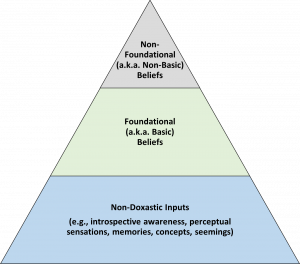Where Does the Epistemological Idea of Justification Come From
2 Epistemic Justification
Todd R. Long
Upon completion of this chapter, readers will be able to:
- Identify the distinctive epistemic kind of justification.
- Distinguish internalist theories of epistemic justification from externalist theories of epistemic justification.
- Explain the characteristic features of popular theories of epistemic justification.
- Recognize an explanatory challenge for each theory of epistemic justification.
The Basic Idea of Epistemic Justification

In Plato's Meno, the ancient philosopher Socrates (ca. 469–399 BCE) raised the most important question in the history of epistemology: what must be added to true belief for a person to know something? Socrates was asking about what epistemologists call , which is widely thought to be a requirement for . And it's not just any old requirement: epistemic justification provides a crucial "knowledge-contributing link" between a person and a person's believing that a proposition is true.[1] What this knowledge-contributing link amounts to is a matter of some controversy: debates among epistemologists are sometimes framed in terms of how correctly to interpret the truism that epistemic justification is "truth-conducive" (that is, justification makes the belief likely to be true).[2]
To appreciate its importance, consider an example: suppose a police officer knocks on Kim's door and informs Kim that her husband has been in a horrendous, massive automobile accident. Kim immediately finds herself believing proposition p: "my husband has escaped unharmed." Kim believes p solely because she very much wants it to be true. Epistemologists agree that a belief based merely on wishful thinking isn't knowledge. In this case, Kim doesn't know that p, even if it happens to be true. What's missing is a knowledge-contributing (i.e., epistemic) justification for believing that p is true.
But what exactly is epistemic justification? In Plato's Meno (98a), Socrates says knowledge is true belief plus an account of the reason why. Socrates's idea helps us see that epistemic justification is supposed to be what makes believing (i.e., pertaining to reasons) in the way that counts toward knowledge. When you have epistemic justification for believing a proposition p, you thereby have a knowledge-contributing entitlement or right or warrant or good reason to believe that p is true.
This focus on aiming at or getting at the truth distinguishes epistemic justification from other kinds of justification. Perhaps the immediate comfort Kim's belief affords her gives her a "psychological" justification for believing p. Perhaps it's in Kim's best interest to believe p (in which case she has a "prudential" justification for believing p). Indeed, there may be many measures of the appropriateness of belief. Each measure has its particular standard for evaluation. The distinctive epistemic standard pertains to rationality with respect to the truth. Some notable approaches (discussed below) to explaining this epistemic standard include evidentialism, strong/modest foundationalism, coherentism, explanationism, infinitism, virtue responsibilism, virtue reliabilism, process reliabilism, and proper functionalism.
Epistemic justification (hereafter, "justification") comes in degrees. What degree is required for knowledge? Although there is no consensus, most epistemologists think knowledge-level justification has a high standard, but not so high that we rarely have knowledge. After all, many point out, "knowledge" is a term in ordinary use, and ordinary people think we often know things such as "that's a tree" (via tree-ish visual experience), "two plus three equals five" (by thinking through the equation), and "I had breakfast this morning" (via vivid memory experience). If this common sense is correct, then having knowledge-level justification for believing p doesn't require that p is true. This is because our justification for believing many propositions the commonsense view says we know is consistent with the falsity of those propositions. For example, suppose a tree-ish visual experience is the source of Jane's knowledge that p: "there's a tree." Because a realistic hallucination could mimic Jane's visual experience, the character of Jane's tree-ish experience doesn't guarantee p's truth. Therefore, the commonsense view implies : it's possible to be justified in believing a false proposition.[3]
(stances on the truth value of a proposition) include belief, disbelief, and suspension of judgment. Discussions about epistemic justification often single out beliefs, as this chapter does. An important reason for this is that the justificatory status of the other attitudes can be defined in terms of the justificatory status of beliefs. This is because the attitudes themselves are inter-definable.
To p is to think that p is true (i.e., to think that reality is as p says it is).
To p is to believe that p is false; thus, to disbelieve p is to believe not-p. So, it is justified to disbelieve p when it is justified to believe that p is false. For example, given modern scientific evidence, it is justified to disbelieve that the sun orbits the earth because it is justified to believe that the sun does not orbit the earth (that the reverse is instead the case).
To on p is to consider p yet neither believe nor disbelieve it: it is to be undecided on whether p is true or false. When you suspend judgment on p, you thereby suspend judgment on not-p. Accordingly, it is justified to suspend judgment on p when it is justified neither to believe p nor to disbelieve p.
Suspension of judgment raises an interesting question about justification. If one lacks reason to believe either p or not-p over the other, does this mean that one has two equally rational options—in other words, that it is justified for one to believe p and justified for one to believe not-p? Although some find such "permissivism" tempting, there are powerful reasons to reject it. For example, suppose Detective Derby's criminal investigation reveals two equally likely suspects (Devin and Kevin) in a one-person crime, and Derby declares Devin as guilty. We would rightly think Derby's judgment is biased, because he had no better reason to think Devin is guilty than he had to think Kevin is guilty. Suspension of judgment appears to be the uniquely rational attitude to have when the scales of justification are evenly balanced. Thus, it's worthwhile to consider what any justification theory implies about suspension of judgment.
Two Approaches: Internalism and Externalism
Among epistemologists, the terms and are used in a variety of ways. Most fundamentally, internalists think the factors that make for justification entirely depend on what's going on inside a person's mind. In contrast, externalists think the relevant facts are settled by a person's mental states plus factors outside the person's mind.[4] What's at stake? Well, internalists usually take their view to entail that, given one's mental states at a time, there's a necessary fact settling which doxastic attitude (if any) one is justified in having toward any proposition at that time. Thus, if two people were somehow exactly alike mentally, then they'd be exactly alike justificationally. Externalists disagree, claiming that whether a person with a particular set of mental states justifiably believes p is contingent on factors external to the person's mind. Accordingly, two people could be in exactly the same mental states and yet one's belief that p could be justified, and the other's belief that p could be unjustified. Below we will consider some illustrative examples.
Internalist Theories
accept the traditional view that justification is entirely a matter of one's evidence, where means an indication of truth to a person. Evidentialists tend to be internalists because evidence in epistemology consists, roughly, of information that can be used in thought. But since one can't use in thought something that is outside one's mind, evidentialists usually think of evidence as internal to the mind.
Because it's plausible that only an indication of truth could yield a "good epistemic reason" to believe that a proposition is true, evidentialists say their view plausibly explains the link justification is supposed to provide between a person and their belief that a proposition is true. When a person's overall evidence supports proposition p better than not-p, p is probable for that person (i.e., p is more likely to be true than false, given the information that person has to go on). And as evidentialists point out, when you are in that situation, it is epistemically rational for you to believe that p is true. Evidentialists, then, typically agree that justification is truth-conducive in the sense that a person's justified beliefs are probably true given the person's overall evidence.[5] Nevertheless, evidentialists differ on many details, including the structure of justified beliefs.
A. Evidentialist Foundationalism
According to , a person's justified beliefs have a foundational structure similar to a well-built house or pyramid supported by a solid foundation. Accordingly, anyone who has justified beliefs has foundational beliefs that can "support" other non-foundational beliefs. A (or ) is a belief that is not formed on the basis of other beliefs. A (or ) is a belief that is formed on the basis of other beliefs. Any non-basic belief is thus "supported" by at least one basic belief.

Evidentialist foundationalists agree that justification has a foundationalist structure, and that all justified beliefs are supported by the person's evidence; however, they differ about how basic beliefs and non-basic beliefs get their respective justification.
think all our justified basic beliefs are about our own mental states (e.g., "it seems to me that there's a tree") or simple logical matters (e.g., "[latex]2+3 = 5[/latex]") and are justified because we're "infallible" about such matters (i.e., we can't be mistaken about them). We can tell they are true because the evidence of their truth is given to us transparently in the very experiences that elicit foundational beliefs.
One challenge for strong foundationalism comes from therapeutic psychology. We may often be correct about our own mental states, but therapists tell us this is not always so (think of the man in a therapy session who declares "I am not angry!" while white-knuckling his chair as his red, distorted face shakes with, well, anger!). Because we can be mistaken about our mental states, strong foundationalists need a principled way to distinguish the mental states that we cannot be mistaken about from the mental states that we can be mistaken about.
avoid this problem by claiming that our basic beliefs are any beliefs we have immediately upon having a non-doxastic experience (e.g., sensory experience). This view allows more beliefs to count as basic. To appreciate this point, note that ordinarily, as we're walking around outdoors, we form beliefs such as "there's a tree" immediately upon having a particular (tree-ish) visual experience. We don't first think, "it seems to me that there's a tree" and then think "if it seems to me that there's a tree, then there's a tree," and then finally conclude "there's a tree"; rather, upon having the visual experience we spontaneously believe "there's a tree." Modest foundationalists say that such a belief is psychologically basic, because one isn't inferring it from other beliefs one has. Now, reflection reveals that we are certainly not infallible about propositions such as "there's a tree." After all, you might have a realistic dream or hallucination that mimics ordinary sensory perception; so, you might form a basic belief that "that's a tree" even though it's false.
Modest foundationalism thus faces a challenge: if we're not infallible with respect to our basic beliefs concerning external objects such as trees, then what makes our basic beliefs about external objects justified? Surely not all beliefs formed spontaneously upon an experience are justified, for what about a person who spontaneously believes "I will die tonight" immediately upon a visual experience of an arrangement of tea leaves at the bottom of a cup? This belief seems epistemically no better than does Kim's belief (see above) based on wishful thinking. Modest foundationalists, then, need a principled way to distinguish the epistemically proper responses to experience from the epistemically improper ones.

There remains the question of how non-basic beliefs get their justification on the basis of justified basic beliefs. —named for the early modern philosopher René Descartes (1596–1650)—is a strong foundationalist view claiming that non-basic beliefs are justified only by from justified basic beliefs (see Table 1 below on deduction and other forms of reasoning). Descartes insisted on this stringent requirement because he wanted a theory of knowledge implying that when one knows p, one is "epistemically certain" that p is true (i.e., your justification is so good, you can tell you couldn't be wrong about p). To keep this requirement steadfastly in mind, Descartes constructed what became his famous : suppose there were to exist an evil demon powerful enough to deceive you as much as you can be deceived. Only beliefs that could withstand such an evil demon's deception would be epistemically certain for you. Accordingly, Descartes thought, non-basic beliefs can be justified only on the basis of deduction from perfectly certain basic beliefs, because proper deduction is the only form of reasoning that unfailingly guarantees a true conclusion on the basis of true premises.
A serious problem for Cartesian foundationalism is that propositions about external physical objects (e.g., "that's a tree") do not logically follow from propositions about our mental states (e.g., "it seems to me that that's a tree"). Therefore, Cartesian foundationalism is inadequate to explain our commonsense view that we have a fair amount of knowledge about external physical objects.
Contemporary foundationalists (both strong and modest) avoid this problem by holding that non-basic beliefs can be justified not only by deduction but also by and from one's justified basic beliefs. Although properly done induction or abduction doesn't guarantee the truth of one's non-basic belief, it does plausibly give one a good epistemic reason to believe the proposition is true. For example, a contemporary (non-Cartesian) strong foundationalist might say that "there's a tree" is, under usual circumstances, probably true when you reason to it from a belief about how things seem to you.[6]
| Deduction | Induction | Abduction |
|---|---|---|
| Form of reasoning in which the truth of the premises logically guarantees the truth of the conclusion. | Form of reasoning in which the truth of the premises makes probable the truth of the conclusion. | Form of reasoning to the best explanation of some data. |
Word of caution: Some philosophers use the term "induction" to encompass any non-deductive form of reasoning, including abduction.
B. Pure Coherentism

is the idea that one's belief is justified just when it coheres well with all the other beliefs one has. Coherentists think of the structure of justified beliefs not like a house or pyramid supported by a foundation, but like a spider web in which the various nodes of the web are mutually supported by the whole web structure. Each belief in one's set of beliefs depends for its justification on coherence relations among all of one's beliefs. Accordingly, a belief is part of its own justification.
Coherentists propose various factors that make for coherence among beliefs (e.g., logical consistency among beliefs, probabilistic connections among beliefs, or a lack of unconnected subsystems of beliefs). One prominent coherentist idea is that given a person's set of beliefs, there is some fact about the overall value of that belief system's coherence. If believing proposition p would, when added to the person's set of beliefs, raise the coherence value of the person's overall system of beliefs, then believing p is justified for that person; otherwise, believing p isn't justified.
Pure coherentists face several problems, including explaining how a belief could non-circularly be part of its own justification and explaining precisely what coherence relations are. But perhaps the most challenging is explaining how our experiences figure in justification. Recall that for pure coherentists, justification is entirely a matter of coherence relations among a person's set of beliefs. However, it does seem possible to have a highly coherent system of beliefs even though some of one's beliefs are way out of line with one's experiences. Suppose I'm having an ordinary tree-in-front-of-me visual experience, but I believe there's no tree in front of me. It seems possible for me to have a system of beliefs cohering well with my belief that there's no tree in front of me; but in this case, in which I'm actually having an ordinary tree-ish visual experience, it seems I'm unjustified in believing that there's no tree in front of me.
C. Explanationism
think justification is a matter of which propositions provide the best explanations for a person. This view leaves open how to characterize justification's structure. Some versions imply a hybrid of foundationalism and coherentism. One prominent version holds that justification pertains to the propositions that provide the best explanation available to the person of that person's experiences. Suppose I'm a normal adult having a visual tree-in-front-of-me kind of experience. I have the concept "tree," many times I've been in situations very similar to my current one, and the truth of my beliefs about the presence of trees has been confirmed many times when I've been in those situations. It's plausible that the best explanation available to me of my overall experiences (including my current visual experience) includes the proposition p ("that's a tree") but does not, for example, include q ("that's a cat"). Thus, I'm justified in believing p but not q.
Explanationists say their account of justification avoids the problems we've noted with standard forms of foundationalism and pure coherentism, while incorporating what makes them theoretically attractive. Unlike pure coherentism, explanationism includes experiences in the constitution of justification. An explanationist might say that the best available explanation for a person involves coherence, not just among one's beliefs, but among the relevant explanation and propositions asserting the existence of one's experiences. Experiences themselves can serve as foundations that stop a regress of justification. The main challenge for explanationists is to provide a plausible, principled account of what a best explanation available to a person consists in.
Thinking about the possible structure of justification led the first-century philosopher Agrippa to a famous argument for global skepticism about justification (and hence knowledge). This is known as the or the. It can be summarized as a process-of-elimination argument:

- For a belief B to be justified, the chain of reasons ultimately leading to B must have one of three possible structures:
-
- It is finite and linear.
- It circles back on itself.
- It is infinite.
- We can rule out (c) because we don't have an infinite number of reasons.
- We can rule out (b) because circular reasoning is unjustified.
- We can rule out (a) because the belief B* that is located at the bottom of B's chain would lack justification, and therefore would be unable to justify the rest of the beliefs in the chain, which depend on B*.
- Therefore, no possible structure can yield justification.
Some of the theories of justification can be viewed as proposed solutions to the regress. Foundationalists defend (a) by arguing that basic beliefs can be justified by experiences rather than further beliefs. Coherentists defend something like (b) by denying that it requires defective circular reasoning. Infinitists (see "Unconventional Theories" below) defend (c) by suggesting that our reasons may be potentiality (if not actuality) infinite.
Externalist Theories
Recall that externalists think justification depends not only on facts about a person's mental states but also on factors external to a person's mind. Accordingly, externalists think of justification in terms of causes, processes, or functions that tend to get a person onto the truth. Such causes, processes, or functions do not need to have their origins in a person's mind, nor do they need to comprise evidence the person has to go on in thought (even if people usually have evidence when they satisfy externalist requirements for justification). Externalists say their theories are well-suited to explain the truth-conduciveness of justification (i.e., the link that justification is supposed to provide between a person and the person's belief that a proposition is true). On typical externalist theories, a person's justified beliefs are objectively likely to be true in the sense that justified beliefs are more often true than false.[7]
A. Reliabilism

Reliabilism is the idea that justified beliefs are reliably produced. Although there are multiple species of reliabilism, including "virtue reliabilism,"[8] the most popular is , which holds that justification is a matter of having a belief produced by a reliable process type (i.e., a type of process that produces true beliefs more often than false beliefs). Vision is a general type of process resulting in many individual beliefs among many different people. If more beliefs produced by vision are true than false across all times and places, then "vision" plausibly counts as a reliable process type. The basic idea of process reliabilism is that a belief produced by a reliable process type is justified; otherwise, it's unjustified.
We can appreciate why process reliabilism is externalist by considering an odd example. Suppose Pat and Nat happen to have the same mental states. Pat's an ordinary human living in a world populated by physical objects, just as we take ourselves to be, but Nat is radically deceived by a powerful evil demon (see Descartes's evil demon hypothesis above). It seems to Nat that they're living in a world populated by physical objects, but in reality this is not the case. Now, because Pat and Nat have exactly the same mental states and are thus "introspectively identical," a typical internalist theory implies that Pat and Nat are justified in believing the same propositions. However, according to process reliabilism as described above, Pat's belief that p ("there's a tree") is justified, because it's produced by a reliable process type (vision), whereas Nat's belief that p is unjustified, because it's produced by an unreliable process type (evil demon deception). For process reliabilists, then, whether a person's belief is justified depends on contingent factors external to the person's mind.
This example also illustrates a popular "new evil demon" objection to process reliabilism. It seems that if Pat is justified in believing "there's a tree," then so is Nat; after all, things seem exactly to Nat as they do to Pat. In believing "there's a tree," Pat and Nat are relying on exactly the same information. So, if Pat's reasons are good enough for justification, then so are Nat's.[9]
Another challenge for process reliabilism is known as the . Pat's belief that "there's a tree" is an instance of many different process types, such as (a) sensory experience, (b) visual experience, (c) visual experience from 10 yards away, or (d) visual experience of a medium-size object in clear daylight from 10 yards away. These process types vary in reliability. Which process type is the relevant one that settles whether Pat's belief is justified? The problem generalizes to all beliefs. Without a principled way to determine which process type is the relevant one, we can't actually tell what process reliabilism implies about any instance of belief.
B. Proper Functionalism
According to , justification is a matter of having a belief resulting from proper cognitive function. When a heart functions properly, it pumps blood; similarly, according to proper functionalists, when our cognitive faculties function properly, they produce justified beliefs. But the epistemic story can't be this simple, for something might function properly (as designed) but not function well. So proper functionalists need the notion of "good epistemic function." Their solution is to add conditions pertaining to getting at the truth. The result is a theory like this: a person S's belief B is justified if and only if the cognitive faculties producing B are (a) functioning properly, (b) aimed at truth, and (c) reliable in environments for which they were designed.

To appreciate why proper functionalism is externalist, consider Cal and Mal. Suppose Cal's cognitive system is designed by a god to produce belief B1 ("I'm holding a small round object") when Cal is in mental state M1 (a tactile sensation like we have when holding a billiard ball), but not when he's in state M2 (an olfactory sensation like we have when smelling a rose). In contrast, a powerful alien race has designed Mal's cognitive system not to produce B1 when he's in M1, but rather when he's in M2. Now suppose Cal and Mal have the same mental states, both have belief B1, and both are in M2 but neither is in M1. Although Cal and Mal have exactly the same mental states, proper functionalism implies that Cal's belief B1 is unjustified (because it isn't the result of proper function given its design), but Mal's belief B1 is justified (because it's the result of proper function given its design, and, we may suppose, Mal's cognitive faculties are truth-aimed and reliable). Thus, proper functionalism implies that justification is contingent on facts about the design of one's cognitive system, which are external to one's mind. On this view, as the table below shows, mental duplicates can differ in justification—a feature of externalism generally.
| Person | Cognitive Design | Current Experience | Current Belief | Accords with Cognitive Design? | Implication of Proper Functionalism |
|---|---|---|---|---|---|
| Cal | When in M1 (a tactile sensation as of holding a billiard ball), produce belief B1 ("I'm holding a small, round object"). | M2: an olfactory sensation as of a rose | B1: "I'm holding a small round object." | No | Unjustified |
| Mal | When in M2 (an olfactory sensation as of a rose), produce belief B1 ("I'm holding a small, round object"). | M2: an olfactory sensation as of a rose | B1: "I'm holding a small round object." | Yes | Justified |
A challenge can be appreciated by adding to our example. Suppose the designers of Mal's cognitive system discovered a glitch in consequences of their design: their cognizers would function according to design by reasoning as follows whenever they're in M2:
- "I'm holding a small round object."
- "If I'm holding a small round object, then goblins are living under my planet's surface."
- Thus, "goblins are living under my planet's surface."
Caring greatly about reliable-belief formation but not wanting to fix the design glitch, the alien designers altered features of Mal's planet so that, when cognizers are in M2, goblins usually are living under the planet's surface. Consequently, when Mal reasons from (a) and (b) to (c), his belief that "goblins are living under my planet's surface" is produced by cognitive faculties that are functioning as designed, truth-aimed, and reliable in environments for which they were designed. According to proper functionalism, then, Mal's reasoning process is epistemically good, and his beliefs that (b) and that (c) are justified, even though, as we may suppose, he has no reason at all to believe (b) and (c). In this situation, it seems Mal has engaged in objectively bad reasoning even though all the conditions of proper functionalism are satisfied.
Some epistemologists augment their justification theories with a , which says that, for a person's belief to be justified, there must be no "justification defeaters" for the belief. By definition, a (hereafter "defeater") is something that prevents a belief from being justified. In other words, setting aside all of the defeaters for a person's belief, what remains is good enough for justification. That is, the belief is "justified absent defeaters." This is what epistemologists call (from the Latin for "at first glance" or "upon first inspection"). When a belief is prima facie justified (justified on the assumption that there are no defeaters) and there are in fact no defeaters, the result is —or, justification all things epistemically considered. This is what we normally mean by "justified."
Prima facie justification plus no defeaters (required by no-defeaters clause) = ultima facie justification
Epistemologists sometimes distinguish between "rebutting defeaters" and "undercutting defeaters." A is illustrated in the following example. Suppose you're in a pet shop where, in clear view, one of the store offerings catches your attention. "Tell me about that red dog," you say to the salesperson, who replies, "Oh, that's our new robotic pet. It's so realistic it fools everybody!" The testimony of the salesperson is a rebutting defeater of your prima facie justification for believing p ("that thing I'm looking at is a red-haired dog"); that is, the salesperson's testimony gives you good reason to think p is false. Thus, you lack ultima facie justification for believing p.
An is illustrated by altering the story slightly. Suppose the salesperson tells you there is a strong red light shining on the object you're looking at. The salesperson's testimony is an undercutting defeater of your prima facie justification for believing p. This is because the salesperson gives you good reason to think the object would appear red even if it were not red. Even if the testimony does not give you good reason to think p is false, it does give you good reason to think the source of your belief (visual experience) is, in this situation, not good enough for ultima facie justification.
Externalist theories are in special need of a no-defeaters clause, without which they are susceptible to counterexamples. For example, suppose your belief that p is produced by a reliable process type but you have good reason either to think that p is false or to think that the process producing your belief is unreliable. Without a no-defeaters clause, process reliabilism would implausibly imply that your belief is justified. Internalist evidentialist theories do not need a no-defeaters clause, because a person's total evidence at a time already weighs in any defeaters. Nevertheless, the notion of defeaters is sometimes employed by internalists as a useful tool for thinking about what a person's total evidence indicates.
Unconventional Theories
Some unconventional theories have gained adherents in recent years. is the idea that justification's structure is neither foundationalist nor coherentist (nor a hybrid). Instead, infinitists argue that justification consists in an infinite number of appropriately structured, available reasons on which any justified belief rests. A major challenge is explaining how a human could have an infinite series of available reasons. A more radical departure from conventional theories is , which argues that justified beliefs are the result of intellectually virtuous character traits. Critics complain that, because such beliefs don't need to be likely to be true or based in evidence, virtue responsibilism focuses on moral or pragmatic justification rather than epistemic justification.
Parting Thought
All theories of epistemic justification face reasonable objections or difficult challenges. So, which theory are we justified in accepting as the correct one, and why? The question may not feel pressing, but its answer is important for those of us who desire to live fully reflective lives of wisdom. Understanding epistemic justification might help us to (a) find flaws in skeptical arguments, (b) settle tricky cases about which beliefs to hold when there is substantial disagreement (as in religion, ethics, and politics), and (c) determine what makes knowledge more valuable than true belief. Knowing the truth about the nature of epistemic justification may not be easy, but the further readings below provide excellent ways to discover more about the nuances of views discussed in this chapter, as well as possible responses to the challenges each theory faces.
- As noted in Box 1 of this chapter, theories of epistemic justification often focus on the conditions under which belief is justified. What should a theory of justified belief say about each of the other doxastic attitudes?
- Do internalist or externalist theories better explain the widespread assumption that epistemic justification provides an epistemic reason for one to believe a proposition is true? Why?
- Do internalist or externalist theories better explain the widespread assumption that justification is truth-conducive? Why?
- Which theories of justification best explain what an epistemically proper response to experience consists in? Why?
- What reason, if any, is there for favoring a foundationalist picture of the structure of justification over a coherentist picture, and vice versa?
- Is there a way for a justification theory to incorporate elements of both foundationalism and coherentism? Which justification theory among those discussed in this chapter is best suited to such a project? Why?
- Revisit the regress problem (the Agrippan trilemma) in Box 2. Which justification theory, if any, provides the most adequate response? Why?
- Consider the view known as "phenomenal conservatism" (PC): If it seems to one that p, then it is prima facie justified for one to believe p. First, to demonstrate the importance of the phrase "prima facie," explain how it helps proponents of PC respond to the objection that "things aren't always what they seem." Second, use what you learned in this chapter to construct and evaluate some other potential objections to PC.
Further Reading
Epistemic Justification
Feldman, Richard. 2003. Epistemology (Chapters 4–5). Upper Saddle River, NJ: Prentice Hall.
Watson, Jamie Carlin. n.d. "Epistemic Justification." In The Internet Encyclopedia of Philosophy. https://www.iep.utm.edu/epi-just/.
Internalism and Externalism
Poston, Ted. n.d. "Internalism and Externalism in Epistemology." In The Internet Encyclopedia of Philosophy. https://www.iep.utm.edu/int-ext/.
Evidentialism
Conee, Earl, and Richard Feldman. 2004. Evidentialism: Essays in Epistemology. New York: Oxford University Press.
Mittag, Daniel M. n.d. "Evidentialism." In The Internet Encyclopedia of Philosophy. https://www.iep.utm.edu/evidenti/.
Foundationalism
Hasan, Ali, and Richard Fumerton. 2016. "Foundationalist Theories of Epistemic Justification." In The Stanford Encyclopedia of Philosophy, edited by Edward N. Zalta. https://plato.stanford.edu/archives/fall2018/entries/justep-foundational/.
Coherentism
Murphy, Peter. n.d. "Coherentism in Epistemology." In The Internet Encyclopedia of Philosophy. https://www.iep.utm.edu/coherent/.
Olsson, Erik. 2017. "Coherentist Theories of Epistemic Justification." In The Stanford Encyclopedia of Philosophy, edited by Edward N. Zalta. https://plato.stanford.edu/archives/spr2017/entries/justep-coherence.
Explanationism
McCain, Kevin. 2014. Evidentialism and Epistemic Justification. New York: Routledge.
Poston, Ted. 2014. Reason and Explanation: A Defense of Explanatory Coherentism. London: Palgrave Macmillan.
Justification Defeaters
Senor, Thomas D. 1996. "The Prima/Ultima Facie Justification Distinction in Epistemology." Philosophy and Phenomenological Research 56 (3): 551–66. https://doi.org/10.2307/2108382.
Sudduth, Michael. n.d. "Defeaters in Epistemology." In The Internet Encyclopedia of Philosophy. https://iep.utm.edu/ep-defea/.
Reliabilism
Goldman, Alvin, and Bob Beddor. 2015. "Reliabilist Epistemology." In The Stanford Encyclopedia of Philosophy, edited by Edward N. Zalta. https://plato.stanford.edu/entries/reliabilism/.
Proper Functionalism
Bergmann, Michael. 2006. Justification Without Awareness: A Defense of Epistemic Externalism. Oxford: Oxford University Press.
Boyce, Kenneth. n.d. "Proper Functionalism." In The Internet Encyclopedia of Philosophy. https://www.iep.utm.edu/prop-fun/.
Infinitism
Klein, Peter D., and John Turri. n.d. "Infinitism in Epistemology." In The Internet Encyclopedia of Philosophy. https://www.iep.utm.edu/inf-epis/.
Virtue Epistemology
Baehr, Jason S. n.d. "Virtue Epistemology." In The Internet Encyclopedia of Philosophy. https://www.iep.utm.edu/virtueep/#SH2a.
Battaly, Heather. 2015. Virtue. Cambridge: Polity Press.
Turri, John, Mark Alfano, and John Greco. 2017. "Virtue Epistemology." In The Stanford Encyclopedia of Philosophy, edited by Edward N. Zalta. https://plato.stanford.edu/archives/sum2018/entries/epistemology-virtue/.
Where Does the Epistemological Idea of Justification Come From
Source: https://press.rebus.community/intro-to-phil-epistemology/chapter/epistemic-justification/
0 Response to "Where Does the Epistemological Idea of Justification Come From"
Post a Comment